Challenges of Accounting in Global Organizations
VerifiedAdded on 2023/06/13
|16
|3734
|73
AI Summary
This paper discusses the challenges faced in international accounting management and offers suggestions. It also discusses the impact of economic development and capital market improvement on financial accounting. The challenges are from economic environment, business operation and production, and organizational structures. The paper also explores trends in solving accounting challenges such as green accounting, accounting harmonization, and technology support.
Contribute Materials
Your contribution can guide someone’s learning journey. Share your
documents today.
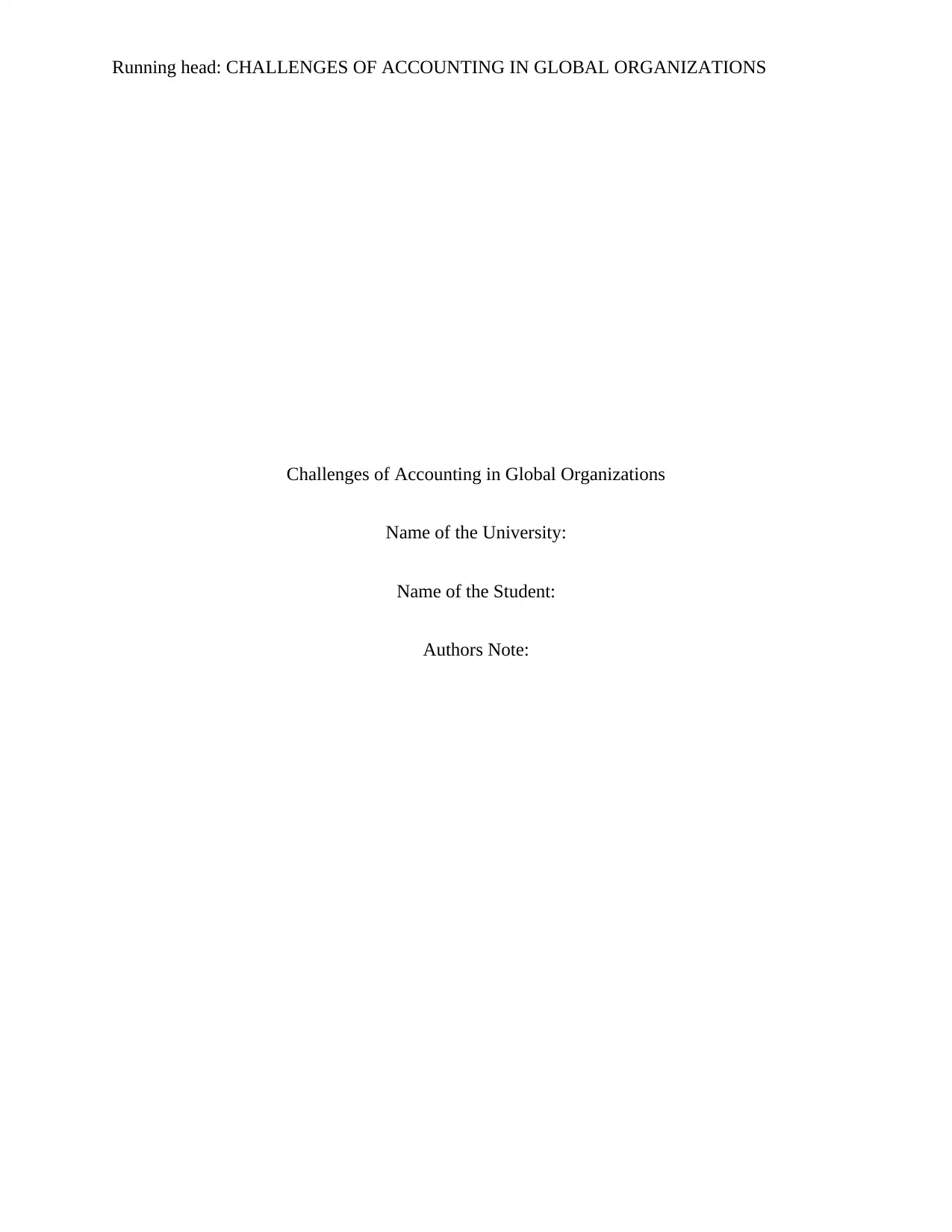
Running head: CHALLENGES OF ACCOUNTING IN GLOBAL ORGANIZATIONS
Challenges of Accounting in Global Organizations
Name of the University:
Name of the Student:
Authors Note:
Challenges of Accounting in Global Organizations
Name of the University:
Name of the Student:
Authors Note:
Secure Best Marks with AI Grader
Need help grading? Try our AI Grader for instant feedback on your assignments.
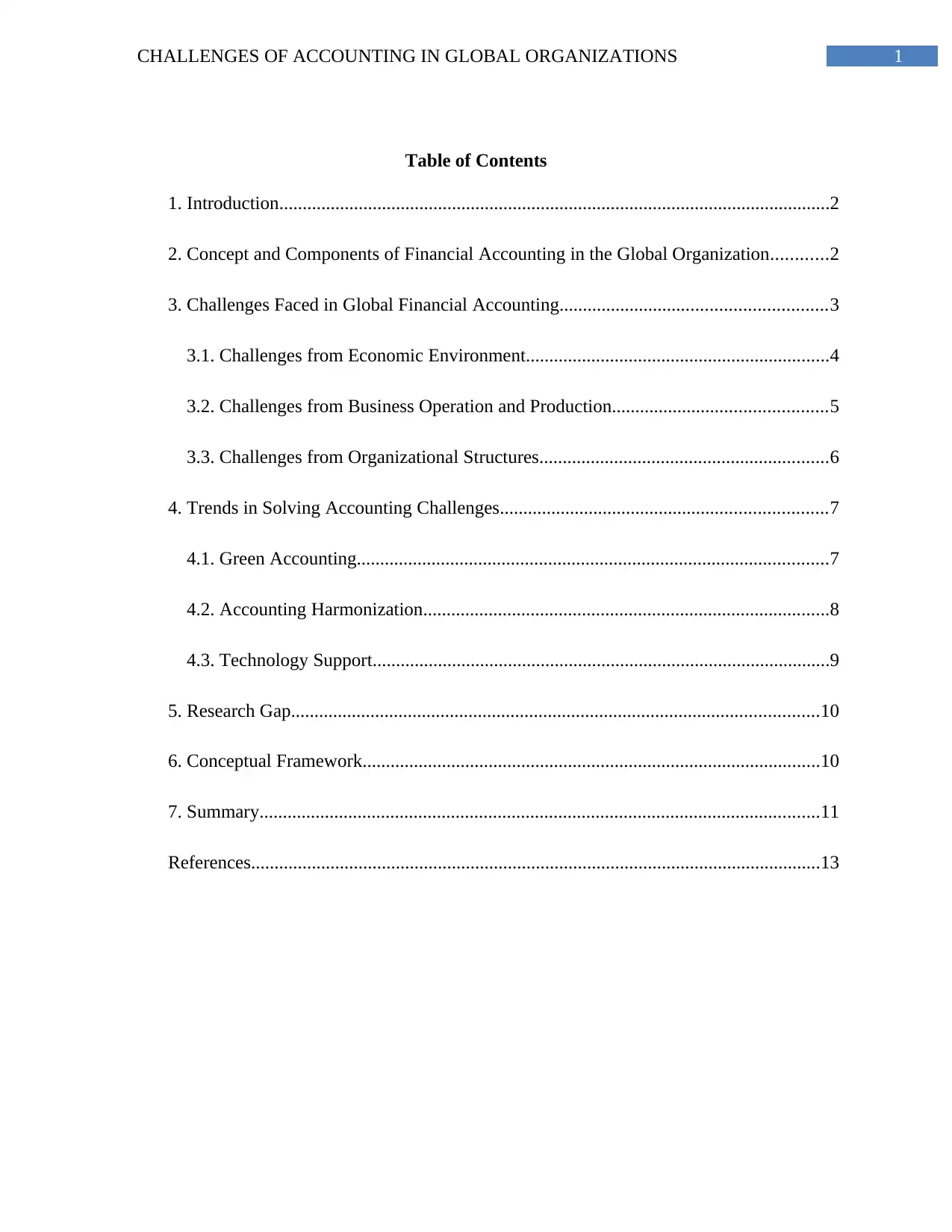
1CHALLENGES OF ACCOUNTING IN GLOBAL ORGANIZATIONS
Table of Contents
1. Introduction......................................................................................................................2
2. Concept and Components of Financial Accounting in the Global Organization............2
3. Challenges Faced in Global Financial Accounting.........................................................3
3.1. Challenges from Economic Environment.................................................................4
3.2. Challenges from Business Operation and Production..............................................5
3.3. Challenges from Organizational Structures..............................................................6
4. Trends in Solving Accounting Challenges......................................................................7
4.1. Green Accounting.....................................................................................................7
4.2. Accounting Harmonization.......................................................................................8
4.3. Technology Support..................................................................................................9
5. Research Gap.................................................................................................................10
6. Conceptual Framework..................................................................................................10
7. Summary........................................................................................................................11
References..........................................................................................................................13
Table of Contents
1. Introduction......................................................................................................................2
2. Concept and Components of Financial Accounting in the Global Organization............2
3. Challenges Faced in Global Financial Accounting.........................................................3
3.1. Challenges from Economic Environment.................................................................4
3.2. Challenges from Business Operation and Production..............................................5
3.3. Challenges from Organizational Structures..............................................................6
4. Trends in Solving Accounting Challenges......................................................................7
4.1. Green Accounting.....................................................................................................7
4.2. Accounting Harmonization.......................................................................................8
4.3. Technology Support..................................................................................................9
5. Research Gap.................................................................................................................10
6. Conceptual Framework..................................................................................................10
7. Summary........................................................................................................................11
References..........................................................................................................................13
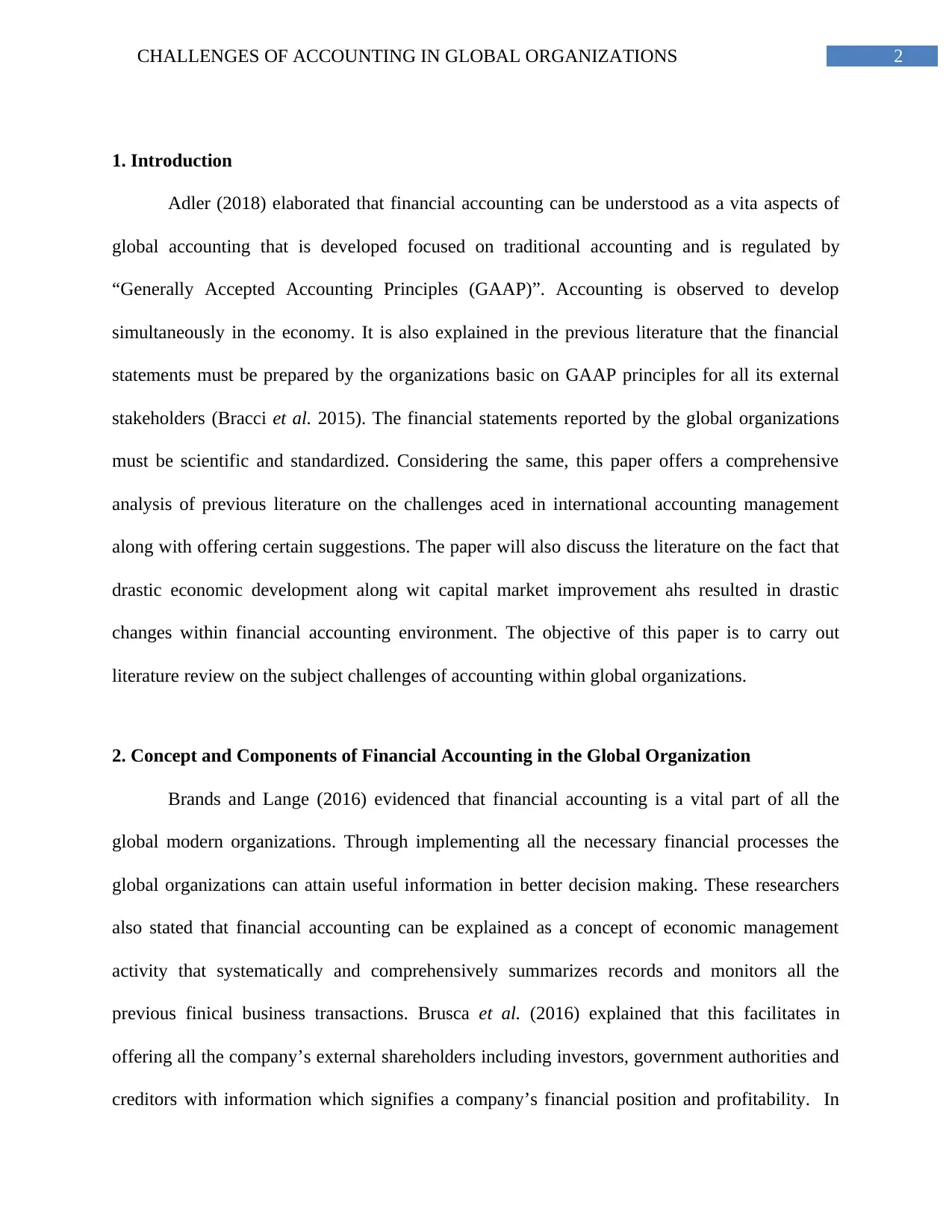
2CHALLENGES OF ACCOUNTING IN GLOBAL ORGANIZATIONS
1. Introduction
Adler (2018) elaborated that financial accounting can be understood as a vita aspects of
global accounting that is developed focused on traditional accounting and is regulated by
“Generally Accepted Accounting Principles (GAAP)”. Accounting is observed to develop
simultaneously in the economy. It is also explained in the previous literature that the financial
statements must be prepared by the organizations basic on GAAP principles for all its external
stakeholders (Bracci et al. 2015). The financial statements reported by the global organizations
must be scientific and standardized. Considering the same, this paper offers a comprehensive
analysis of previous literature on the challenges aced in international accounting management
along with offering certain suggestions. The paper will also discuss the literature on the fact that
drastic economic development along wit capital market improvement ahs resulted in drastic
changes within financial accounting environment. The objective of this paper is to carry out
literature review on the subject challenges of accounting within global organizations.
2. Concept and Components of Financial Accounting in the Global Organization
Brands and Lange (2016) evidenced that financial accounting is a vital part of all the
global modern organizations. Through implementing all the necessary financial processes the
global organizations can attain useful information in better decision making. These researchers
also stated that financial accounting can be explained as a concept of economic management
activity that systematically and comprehensively summarizes records and monitors all the
previous finical business transactions. Brusca et al. (2016) explained that this facilitates in
offering all the company’s external shareholders including investors, government authorities and
creditors with information which signifies a company’s financial position and profitability. In
1. Introduction
Adler (2018) elaborated that financial accounting can be understood as a vita aspects of
global accounting that is developed focused on traditional accounting and is regulated by
“Generally Accepted Accounting Principles (GAAP)”. Accounting is observed to develop
simultaneously in the economy. It is also explained in the previous literature that the financial
statements must be prepared by the organizations basic on GAAP principles for all its external
stakeholders (Bracci et al. 2015). The financial statements reported by the global organizations
must be scientific and standardized. Considering the same, this paper offers a comprehensive
analysis of previous literature on the challenges aced in international accounting management
along with offering certain suggestions. The paper will also discuss the literature on the fact that
drastic economic development along wit capital market improvement ahs resulted in drastic
changes within financial accounting environment. The objective of this paper is to carry out
literature review on the subject challenges of accounting within global organizations.
2. Concept and Components of Financial Accounting in the Global Organization
Brands and Lange (2016) evidenced that financial accounting is a vital part of all the
global modern organizations. Through implementing all the necessary financial processes the
global organizations can attain useful information in better decision making. These researchers
also stated that financial accounting can be explained as a concept of economic management
activity that systematically and comprehensively summarizes records and monitors all the
previous finical business transactions. Brusca et al. (2016) explained that this facilitates in
offering all the company’s external shareholders including investors, government authorities and
creditors with information which signifies a company’s financial position and profitability. In
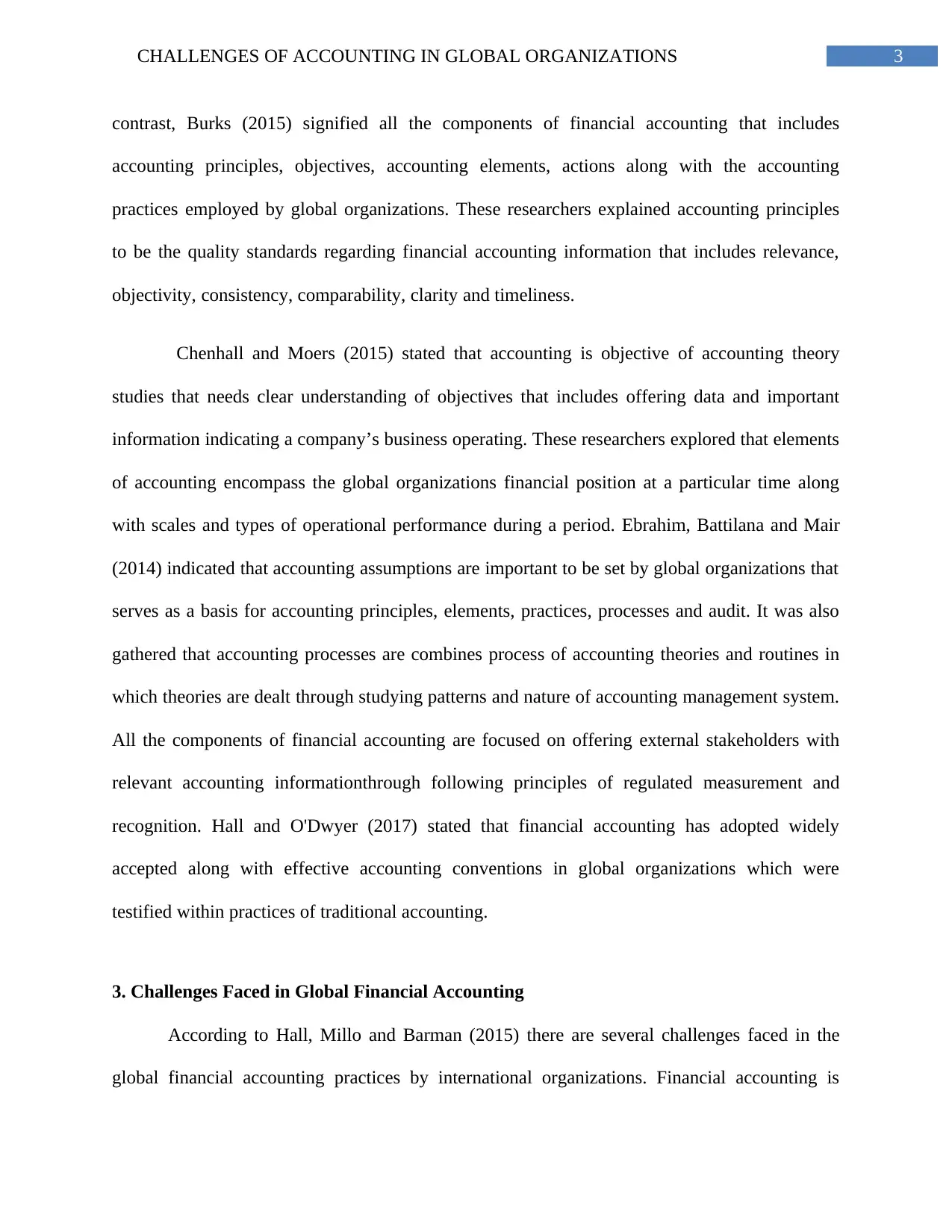
3CHALLENGES OF ACCOUNTING IN GLOBAL ORGANIZATIONS
contrast, Burks (2015) signified all the components of financial accounting that includes
accounting principles, objectives, accounting elements, actions along with the accounting
practices employed by global organizations. These researchers explained accounting principles
to be the quality standards regarding financial accounting information that includes relevance,
objectivity, consistency, comparability, clarity and timeliness.
Chenhall and Moers (2015) stated that accounting is objective of accounting theory
studies that needs clear understanding of objectives that includes offering data and important
information indicating a company’s business operating. These researchers explored that elements
of accounting encompass the global organizations financial position at a particular time along
with scales and types of operational performance during a period. Ebrahim, Battilana and Mair
(2014) indicated that accounting assumptions are important to be set by global organizations that
serves as a basis for accounting principles, elements, practices, processes and audit. It was also
gathered that accounting processes are combines process of accounting theories and routines in
which theories are dealt through studying patterns and nature of accounting management system.
All the components of financial accounting are focused on offering external stakeholders with
relevant accounting informationthrough following principles of regulated measurement and
recognition. Hall and O'Dwyer (2017) stated that financial accounting has adopted widely
accepted along with effective accounting conventions in global organizations which were
testified within practices of traditional accounting.
3. Challenges Faced in Global Financial Accounting
According to Hall, Millo and Barman (2015) there are several challenges faced in the
global financial accounting practices by international organizations. Financial accounting is
contrast, Burks (2015) signified all the components of financial accounting that includes
accounting principles, objectives, accounting elements, actions along with the accounting
practices employed by global organizations. These researchers explained accounting principles
to be the quality standards regarding financial accounting information that includes relevance,
objectivity, consistency, comparability, clarity and timeliness.
Chenhall and Moers (2015) stated that accounting is objective of accounting theory
studies that needs clear understanding of objectives that includes offering data and important
information indicating a company’s business operating. These researchers explored that elements
of accounting encompass the global organizations financial position at a particular time along
with scales and types of operational performance during a period. Ebrahim, Battilana and Mair
(2014) indicated that accounting assumptions are important to be set by global organizations that
serves as a basis for accounting principles, elements, practices, processes and audit. It was also
gathered that accounting processes are combines process of accounting theories and routines in
which theories are dealt through studying patterns and nature of accounting management system.
All the components of financial accounting are focused on offering external stakeholders with
relevant accounting informationthrough following principles of regulated measurement and
recognition. Hall and O'Dwyer (2017) stated that financial accounting has adopted widely
accepted along with effective accounting conventions in global organizations which were
testified within practices of traditional accounting.
3. Challenges Faced in Global Financial Accounting
According to Hall, Millo and Barman (2015) there are several challenges faced in the
global financial accounting practices by international organizations. Financial accounting is
Secure Best Marks with AI Grader
Need help grading? Try our AI Grader for instant feedback on your assignments.
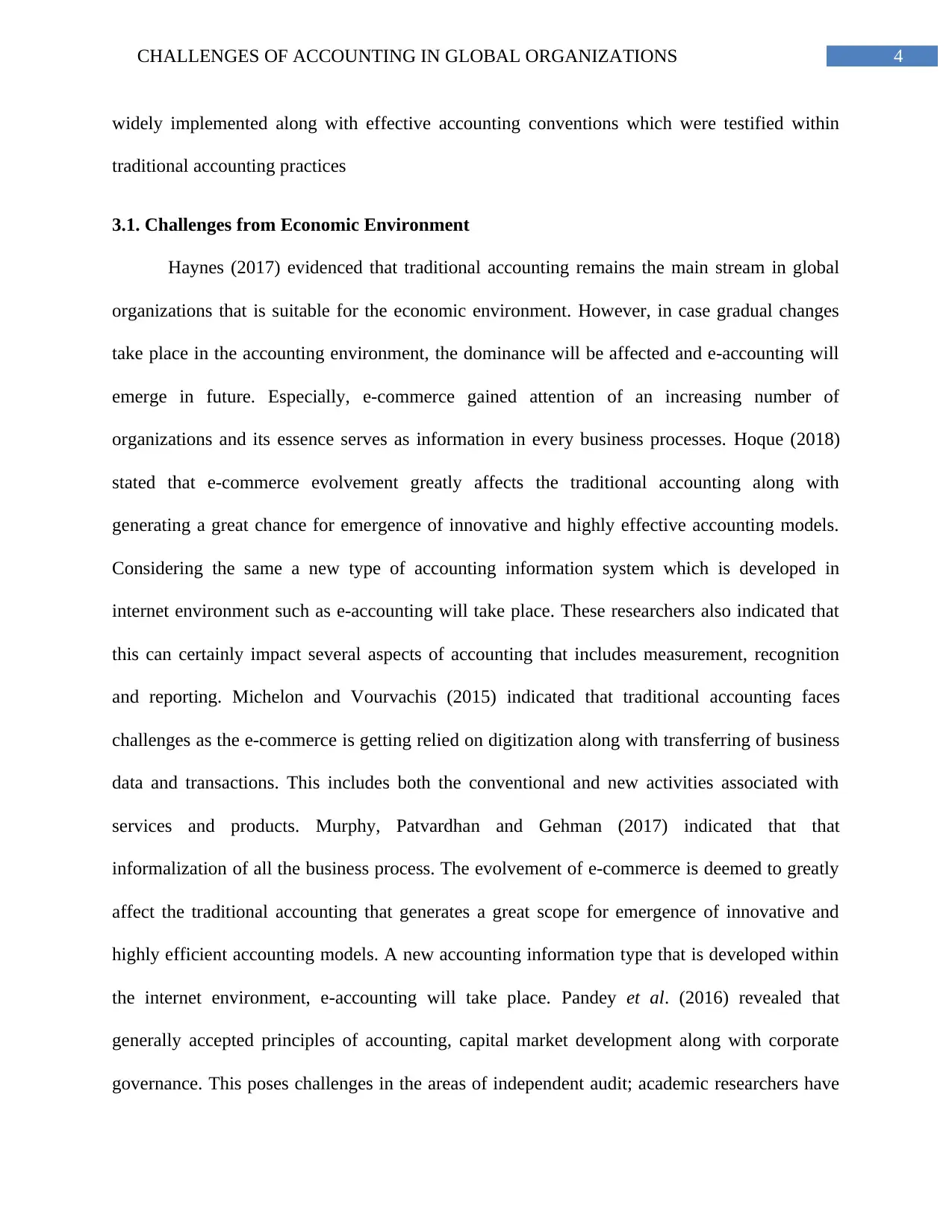
4CHALLENGES OF ACCOUNTING IN GLOBAL ORGANIZATIONS
widely implemented along with effective accounting conventions which were testified within
traditional accounting practices
3.1. Challenges from Economic Environment
Haynes (2017) evidenced that traditional accounting remains the main stream in global
organizations that is suitable for the economic environment. However, in case gradual changes
take place in the accounting environment, the dominance will be affected and e-accounting will
emerge in future. Especially, e-commerce gained attention of an increasing number of
organizations and its essence serves as information in every business processes. Hoque (2018)
stated that e-commerce evolvement greatly affects the traditional accounting along with
generating a great chance for emergence of innovative and highly effective accounting models.
Considering the same a new type of accounting information system which is developed in
internet environment such as e-accounting will take place. These researchers also indicated that
this can certainly impact several aspects of accounting that includes measurement, recognition
and reporting. Michelon and Vourvachis (2015) indicated that traditional accounting faces
challenges as the e-commerce is getting relied on digitization along with transferring of business
data and transactions. This includes both the conventional and new activities associated with
services and products. Murphy, Patvardhan and Gehman (2017) indicated that that
informalization of all the business process. The evolvement of e-commerce is deemed to greatly
affect the traditional accounting that generates a great scope for emergence of innovative and
highly efficient accounting models. A new accounting information type that is developed within
the internet environment, e-accounting will take place. Pandey et al. (2016) revealed that
generally accepted principles of accounting, capital market development along with corporate
governance. This poses challenges in the areas of independent audit; academic researchers have
widely implemented along with effective accounting conventions which were testified within
traditional accounting practices
3.1. Challenges from Economic Environment
Haynes (2017) evidenced that traditional accounting remains the main stream in global
organizations that is suitable for the economic environment. However, in case gradual changes
take place in the accounting environment, the dominance will be affected and e-accounting will
emerge in future. Especially, e-commerce gained attention of an increasing number of
organizations and its essence serves as information in every business processes. Hoque (2018)
stated that e-commerce evolvement greatly affects the traditional accounting along with
generating a great chance for emergence of innovative and highly effective accounting models.
Considering the same a new type of accounting information system which is developed in
internet environment such as e-accounting will take place. These researchers also indicated that
this can certainly impact several aspects of accounting that includes measurement, recognition
and reporting. Michelon and Vourvachis (2015) indicated that traditional accounting faces
challenges as the e-commerce is getting relied on digitization along with transferring of business
data and transactions. This includes both the conventional and new activities associated with
services and products. Murphy, Patvardhan and Gehman (2017) indicated that that
informalization of all the business process. The evolvement of e-commerce is deemed to greatly
affect the traditional accounting that generates a great scope for emergence of innovative and
highly efficient accounting models. A new accounting information type that is developed within
the internet environment, e-accounting will take place. Pandey et al. (2016) revealed that
generally accepted principles of accounting, capital market development along with corporate
governance. This poses challenges in the areas of independent audit; academic researchers have
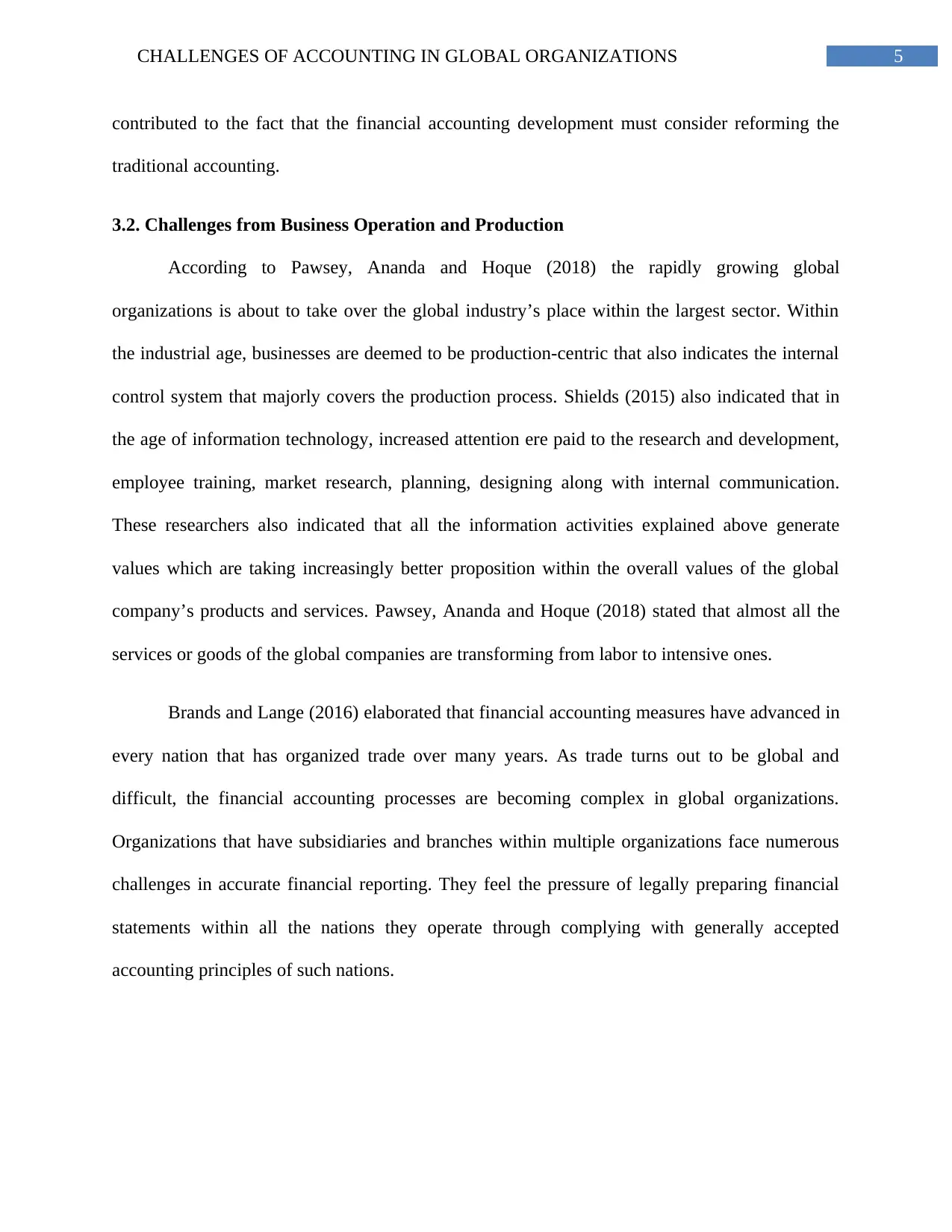
5CHALLENGES OF ACCOUNTING IN GLOBAL ORGANIZATIONS
contributed to the fact that the financial accounting development must consider reforming the
traditional accounting.
3.2. Challenges from Business Operation and Production
According to Pawsey, Ananda and Hoque (2018) the rapidly growing global
organizations is about to take over the global industry’s place within the largest sector. Within
the industrial age, businesses are deemed to be production-centric that also indicates the internal
control system that majorly covers the production process. Shields (2015) also indicated that in
the age of information technology, increased attention ere paid to the research and development,
employee training, market research, planning, designing along with internal communication.
These researchers also indicated that all the information activities explained above generate
values which are taking increasingly better proposition within the overall values of the global
company’s products and services. Pawsey, Ananda and Hoque (2018) stated that almost all the
services or goods of the global companies are transforming from labor to intensive ones.
Brands and Lange (2016) elaborated that financial accounting measures have advanced in
every nation that has organized trade over many years. As trade turns out to be global and
difficult, the financial accounting processes are becoming complex in global organizations.
Organizations that have subsidiaries and branches within multiple organizations face numerous
challenges in accurate financial reporting. They feel the pressure of legally preparing financial
statements within all the nations they operate through complying with generally accepted
accounting principles of such nations.
contributed to the fact that the financial accounting development must consider reforming the
traditional accounting.
3.2. Challenges from Business Operation and Production
According to Pawsey, Ananda and Hoque (2018) the rapidly growing global
organizations is about to take over the global industry’s place within the largest sector. Within
the industrial age, businesses are deemed to be production-centric that also indicates the internal
control system that majorly covers the production process. Shields (2015) also indicated that in
the age of information technology, increased attention ere paid to the research and development,
employee training, market research, planning, designing along with internal communication.
These researchers also indicated that all the information activities explained above generate
values which are taking increasingly better proposition within the overall values of the global
company’s products and services. Pawsey, Ananda and Hoque (2018) stated that almost all the
services or goods of the global companies are transforming from labor to intensive ones.
Brands and Lange (2016) elaborated that financial accounting measures have advanced in
every nation that has organized trade over many years. As trade turns out to be global and
difficult, the financial accounting processes are becoming complex in global organizations.
Organizations that have subsidiaries and branches within multiple organizations face numerous
challenges in accurate financial reporting. They feel the pressure of legally preparing financial
statements within all the nations they operate through complying with generally accepted
accounting principles of such nations.
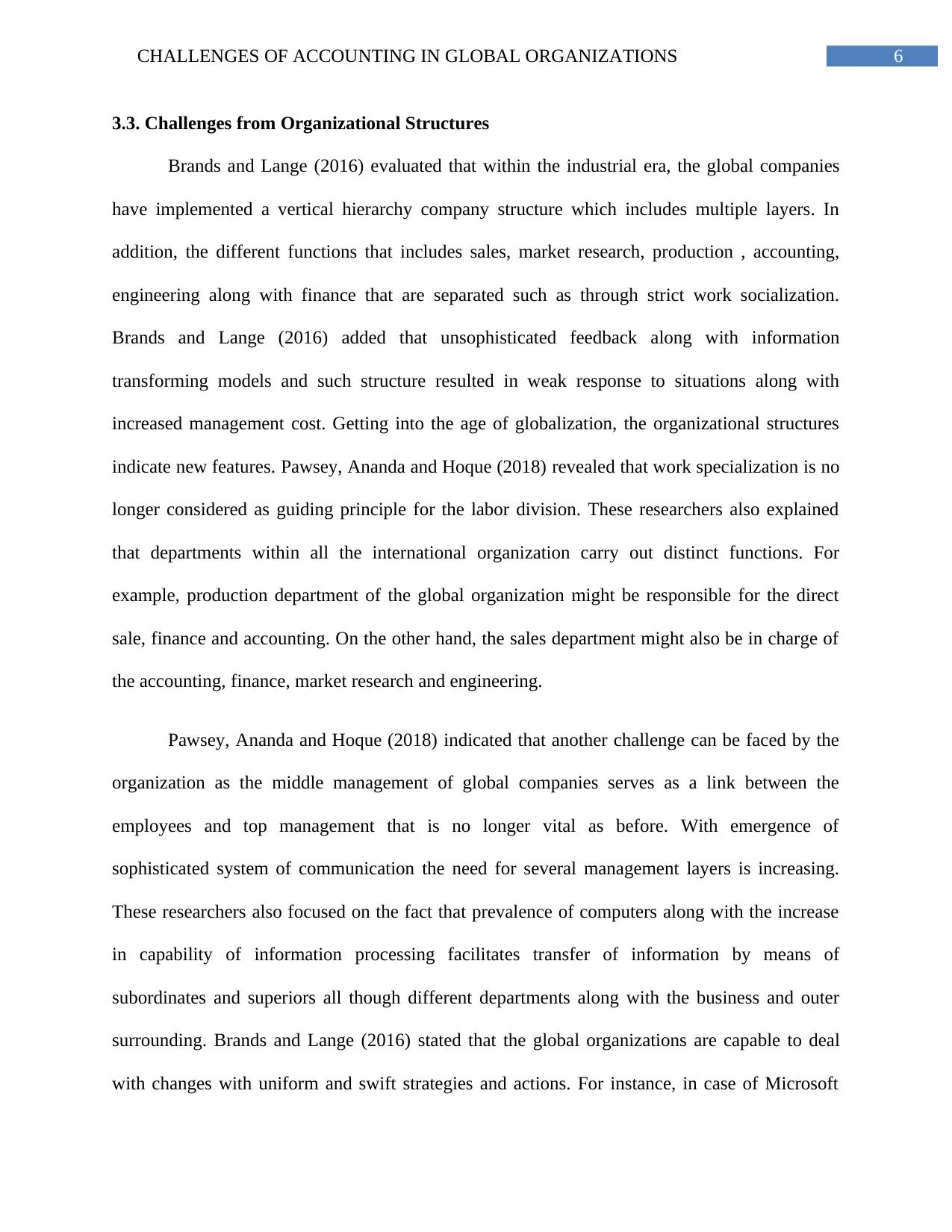
6CHALLENGES OF ACCOUNTING IN GLOBAL ORGANIZATIONS
3.3. Challenges from Organizational Structures
Brands and Lange (2016) evaluated that within the industrial era, the global companies
have implemented a vertical hierarchy company structure which includes multiple layers. In
addition, the different functions that includes sales, market research, production , accounting,
engineering along with finance that are separated such as through strict work socialization.
Brands and Lange (2016) added that unsophisticated feedback along with information
transforming models and such structure resulted in weak response to situations along with
increased management cost. Getting into the age of globalization, the organizational structures
indicate new features. Pawsey, Ananda and Hoque (2018) revealed that work specialization is no
longer considered as guiding principle for the labor division. These researchers also explained
that departments within all the international organization carry out distinct functions. For
example, production department of the global organization might be responsible for the direct
sale, finance and accounting. On the other hand, the sales department might also be in charge of
the accounting, finance, market research and engineering.
Pawsey, Ananda and Hoque (2018) indicated that another challenge can be faced by the
organization as the middle management of global companies serves as a link between the
employees and top management that is no longer vital as before. With emergence of
sophisticated system of communication the need for several management layers is increasing.
These researchers also focused on the fact that prevalence of computers along with the increase
in capability of information processing facilitates transfer of information by means of
subordinates and superiors all though different departments along with the business and outer
surrounding. Brands and Lange (2016) stated that the global organizations are capable to deal
with changes with uniform and swift strategies and actions. For instance, in case of Microsoft
3.3. Challenges from Organizational Structures
Brands and Lange (2016) evaluated that within the industrial era, the global companies
have implemented a vertical hierarchy company structure which includes multiple layers. In
addition, the different functions that includes sales, market research, production , accounting,
engineering along with finance that are separated such as through strict work socialization.
Brands and Lange (2016) added that unsophisticated feedback along with information
transforming models and such structure resulted in weak response to situations along with
increased management cost. Getting into the age of globalization, the organizational structures
indicate new features. Pawsey, Ananda and Hoque (2018) revealed that work specialization is no
longer considered as guiding principle for the labor division. These researchers also explained
that departments within all the international organization carry out distinct functions. For
example, production department of the global organization might be responsible for the direct
sale, finance and accounting. On the other hand, the sales department might also be in charge of
the accounting, finance, market research and engineering.
Pawsey, Ananda and Hoque (2018) indicated that another challenge can be faced by the
organization as the middle management of global companies serves as a link between the
employees and top management that is no longer vital as before. With emergence of
sophisticated system of communication the need for several management layers is increasing.
These researchers also focused on the fact that prevalence of computers along with the increase
in capability of information processing facilitates transfer of information by means of
subordinates and superiors all though different departments along with the business and outer
surrounding. Brands and Lange (2016) stated that the global organizations are capable to deal
with changes with uniform and swift strategies and actions. For instance, in case of Microsoft
Paraphrase This Document
Need a fresh take? Get an instant paraphrase of this document with our AI Paraphraser
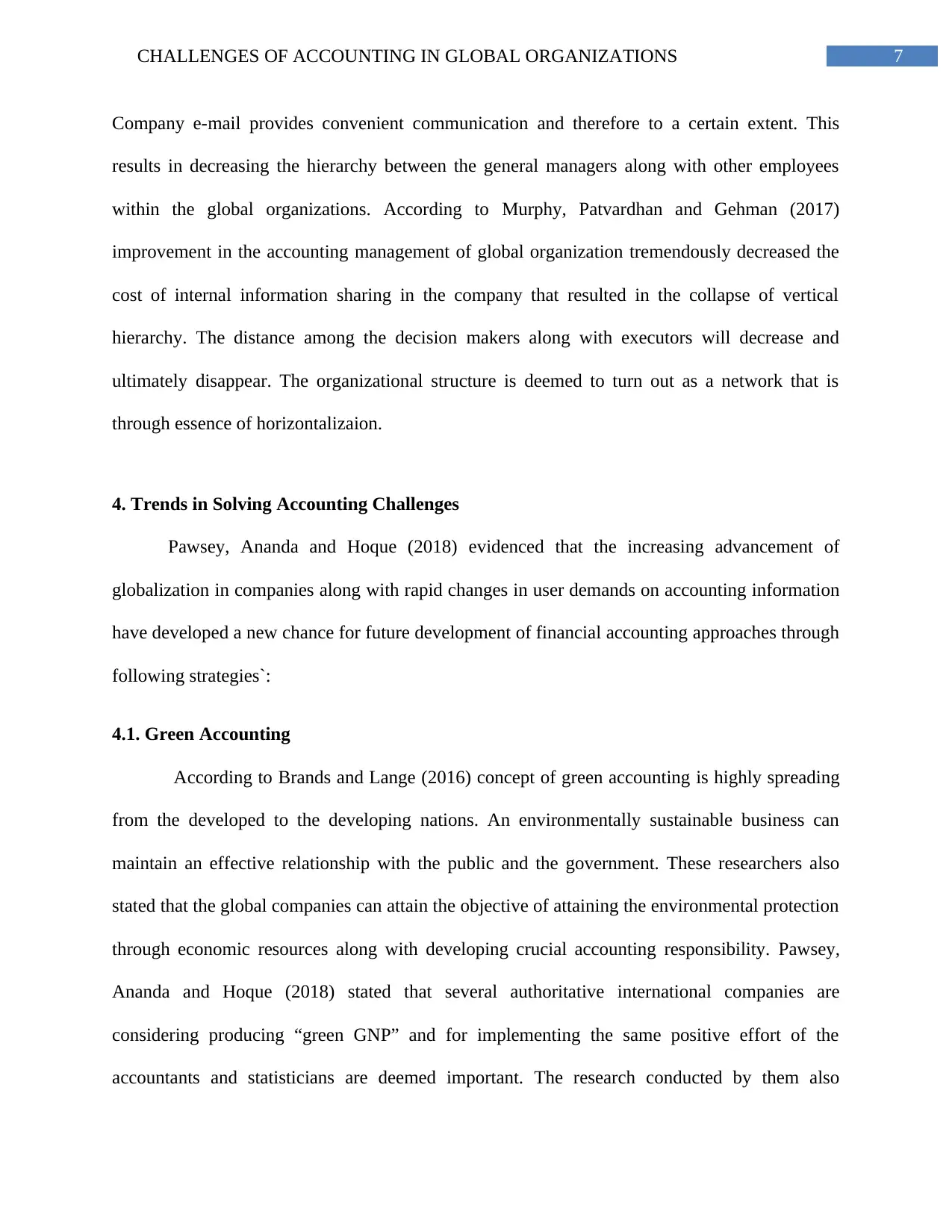
7CHALLENGES OF ACCOUNTING IN GLOBAL ORGANIZATIONS
Company e-mail provides convenient communication and therefore to a certain extent. This
results in decreasing the hierarchy between the general managers along with other employees
within the global organizations. According to Murphy, Patvardhan and Gehman (2017)
improvement in the accounting management of global organization tremendously decreased the
cost of internal information sharing in the company that resulted in the collapse of vertical
hierarchy. The distance among the decision makers along with executors will decrease and
ultimately disappear. The organizational structure is deemed to turn out as a network that is
through essence of horizontalizaion.
4. Trends in Solving Accounting Challenges
Pawsey, Ananda and Hoque (2018) evidenced that the increasing advancement of
globalization in companies along with rapid changes in user demands on accounting information
have developed a new chance for future development of financial accounting approaches through
following strategies`:
4.1. Green Accounting
According to Brands and Lange (2016) concept of green accounting is highly spreading
from the developed to the developing nations. An environmentally sustainable business can
maintain an effective relationship with the public and the government. These researchers also
stated that the global companies can attain the objective of attaining the environmental protection
through economic resources along with developing crucial accounting responsibility. Pawsey,
Ananda and Hoque (2018) stated that several authoritative international companies are
considering producing “green GNP” and for implementing the same positive effort of the
accountants and statisticians are deemed important. The research conducted by them also
Company e-mail provides convenient communication and therefore to a certain extent. This
results in decreasing the hierarchy between the general managers along with other employees
within the global organizations. According to Murphy, Patvardhan and Gehman (2017)
improvement in the accounting management of global organization tremendously decreased the
cost of internal information sharing in the company that resulted in the collapse of vertical
hierarchy. The distance among the decision makers along with executors will decrease and
ultimately disappear. The organizational structure is deemed to turn out as a network that is
through essence of horizontalizaion.
4. Trends in Solving Accounting Challenges
Pawsey, Ananda and Hoque (2018) evidenced that the increasing advancement of
globalization in companies along with rapid changes in user demands on accounting information
have developed a new chance for future development of financial accounting approaches through
following strategies`:
4.1. Green Accounting
According to Brands and Lange (2016) concept of green accounting is highly spreading
from the developed to the developing nations. An environmentally sustainable business can
maintain an effective relationship with the public and the government. These researchers also
stated that the global companies can attain the objective of attaining the environmental protection
through economic resources along with developing crucial accounting responsibility. Pawsey,
Ananda and Hoque (2018) stated that several authoritative international companies are
considering producing “green GNP” and for implementing the same positive effort of the
accountants and statisticians are deemed important. The research conducted by them also
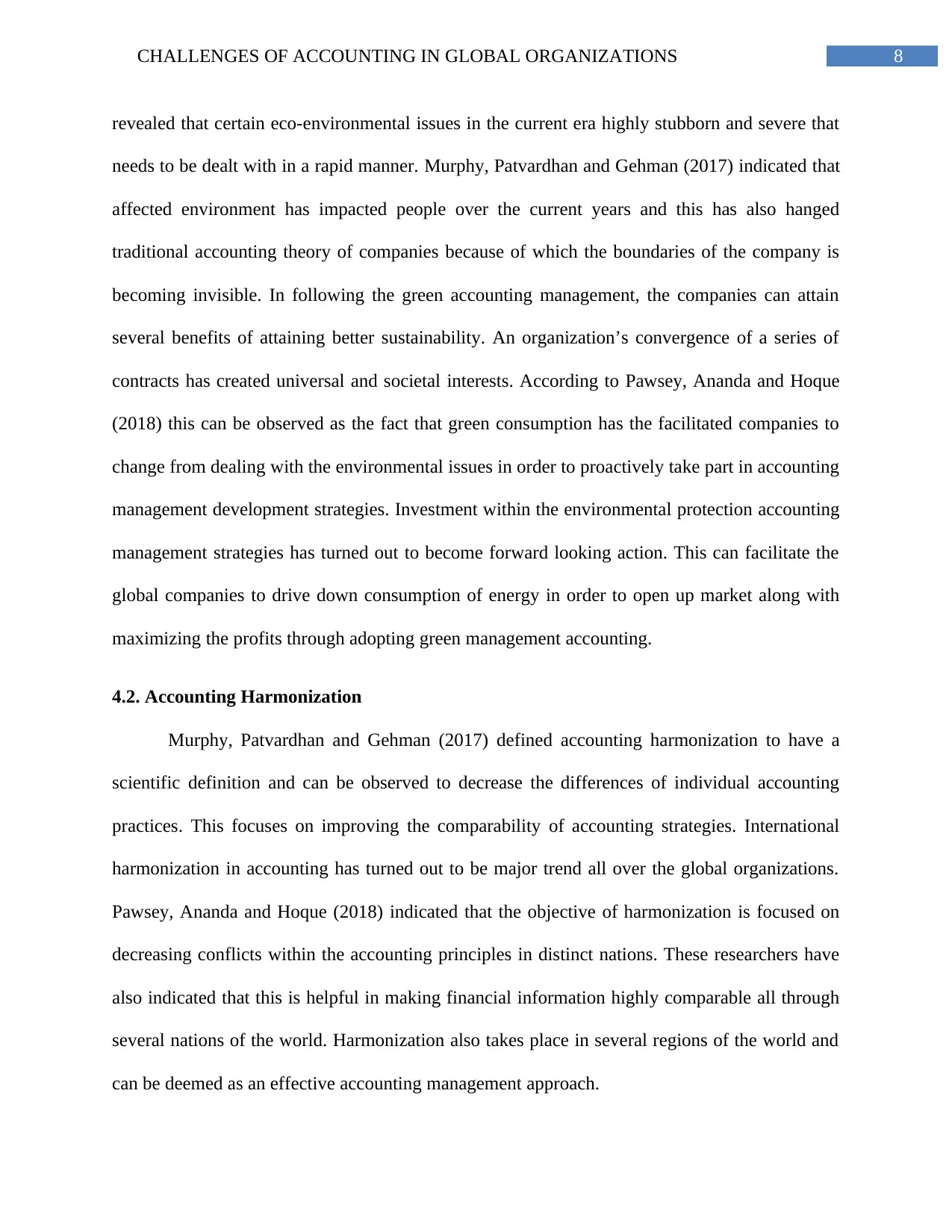
8CHALLENGES OF ACCOUNTING IN GLOBAL ORGANIZATIONS
revealed that certain eco-environmental issues in the current era highly stubborn and severe that
needs to be dealt with in a rapid manner. Murphy, Patvardhan and Gehman (2017) indicated that
affected environment has impacted people over the current years and this has also hanged
traditional accounting theory of companies because of which the boundaries of the company is
becoming invisible. In following the green accounting management, the companies can attain
several benefits of attaining better sustainability. An organization’s convergence of a series of
contracts has created universal and societal interests. According to Pawsey, Ananda and Hoque
(2018) this can be observed as the fact that green consumption has the facilitated companies to
change from dealing with the environmental issues in order to proactively take part in accounting
management development strategies. Investment within the environmental protection accounting
management strategies has turned out to become forward looking action. This can facilitate the
global companies to drive down consumption of energy in order to open up market along with
maximizing the profits through adopting green management accounting.
4.2. Accounting Harmonization
Murphy, Patvardhan and Gehman (2017) defined accounting harmonization to have a
scientific definition and can be observed to decrease the differences of individual accounting
practices. This focuses on improving the comparability of accounting strategies. International
harmonization in accounting has turned out to be major trend all over the global organizations.
Pawsey, Ananda and Hoque (2018) indicated that the objective of harmonization is focused on
decreasing conflicts within the accounting principles in distinct nations. These researchers have
also indicated that this is helpful in making financial information highly comparable all through
several nations of the world. Harmonization also takes place in several regions of the world and
can be deemed as an effective accounting management approach.
revealed that certain eco-environmental issues in the current era highly stubborn and severe that
needs to be dealt with in a rapid manner. Murphy, Patvardhan and Gehman (2017) indicated that
affected environment has impacted people over the current years and this has also hanged
traditional accounting theory of companies because of which the boundaries of the company is
becoming invisible. In following the green accounting management, the companies can attain
several benefits of attaining better sustainability. An organization’s convergence of a series of
contracts has created universal and societal interests. According to Pawsey, Ananda and Hoque
(2018) this can be observed as the fact that green consumption has the facilitated companies to
change from dealing with the environmental issues in order to proactively take part in accounting
management development strategies. Investment within the environmental protection accounting
management strategies has turned out to become forward looking action. This can facilitate the
global companies to drive down consumption of energy in order to open up market along with
maximizing the profits through adopting green management accounting.
4.2. Accounting Harmonization
Murphy, Patvardhan and Gehman (2017) defined accounting harmonization to have a
scientific definition and can be observed to decrease the differences of individual accounting
practices. This focuses on improving the comparability of accounting strategies. International
harmonization in accounting has turned out to be major trend all over the global organizations.
Pawsey, Ananda and Hoque (2018) indicated that the objective of harmonization is focused on
decreasing conflicts within the accounting principles in distinct nations. These researchers have
also indicated that this is helpful in making financial information highly comparable all through
several nations of the world. Harmonization also takes place in several regions of the world and
can be deemed as an effective accounting management approach.
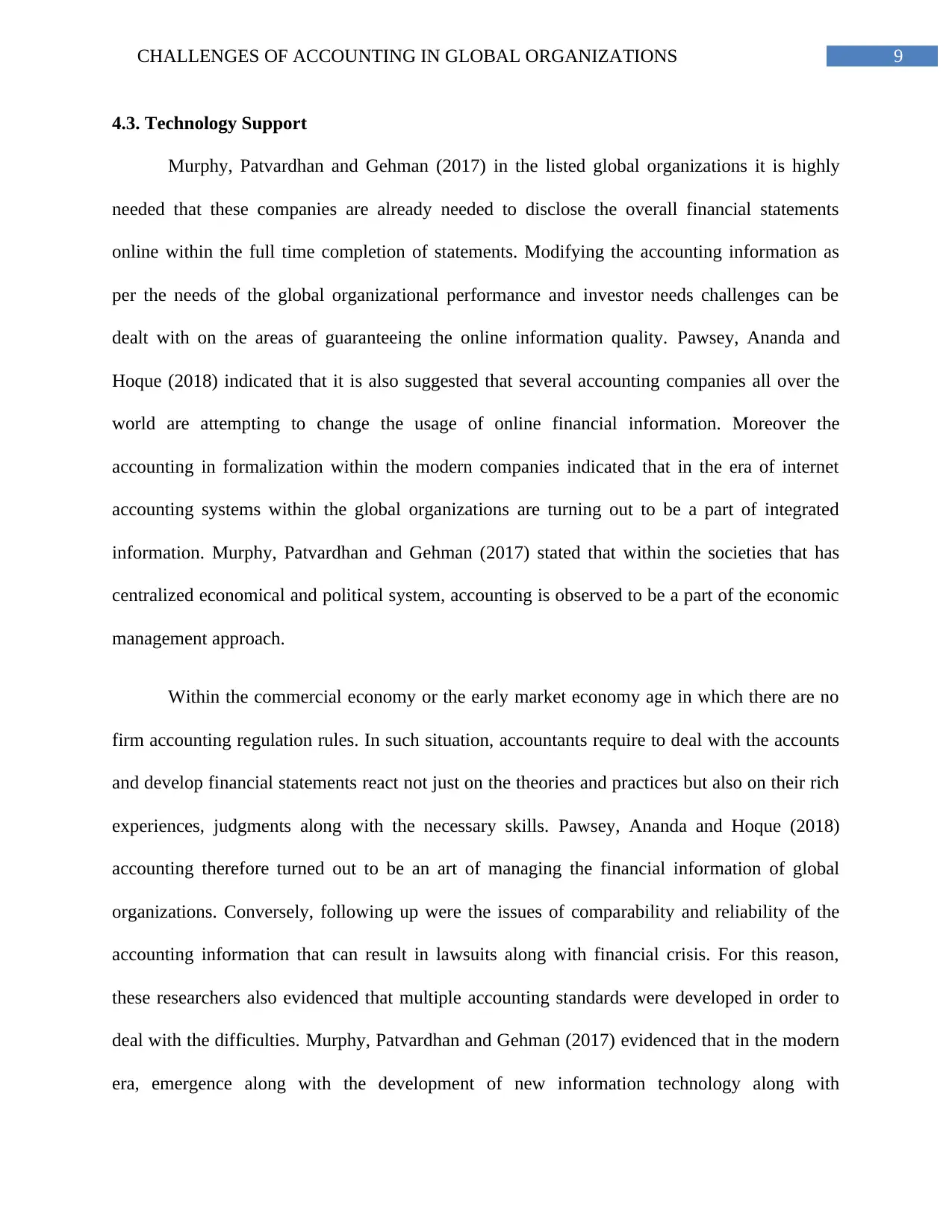
9CHALLENGES OF ACCOUNTING IN GLOBAL ORGANIZATIONS
4.3. Technology Support
Murphy, Patvardhan and Gehman (2017) in the listed global organizations it is highly
needed that these companies are already needed to disclose the overall financial statements
online within the full time completion of statements. Modifying the accounting information as
per the needs of the global organizational performance and investor needs challenges can be
dealt with on the areas of guaranteeing the online information quality. Pawsey, Ananda and
Hoque (2018) indicated that it is also suggested that several accounting companies all over the
world are attempting to change the usage of online financial information. Moreover the
accounting in formalization within the modern companies indicated that in the era of internet
accounting systems within the global organizations are turning out to be a part of integrated
information. Murphy, Patvardhan and Gehman (2017) stated that within the societies that has
centralized economical and political system, accounting is observed to be a part of the economic
management approach.
Within the commercial economy or the early market economy age in which there are no
firm accounting regulation rules. In such situation, accountants require to deal with the accounts
and develop financial statements react not just on the theories and practices but also on their rich
experiences, judgments along with the necessary skills. Pawsey, Ananda and Hoque (2018)
accounting therefore turned out to be an art of managing the financial information of global
organizations. Conversely, following up were the issues of comparability and reliability of the
accounting information that can result in lawsuits along with financial crisis. For this reason,
these researchers also evidenced that multiple accounting standards were developed in order to
deal with the difficulties. Murphy, Patvardhan and Gehman (2017) evidenced that in the modern
era, emergence along with the development of new information technology along with
4.3. Technology Support
Murphy, Patvardhan and Gehman (2017) in the listed global organizations it is highly
needed that these companies are already needed to disclose the overall financial statements
online within the full time completion of statements. Modifying the accounting information as
per the needs of the global organizational performance and investor needs challenges can be
dealt with on the areas of guaranteeing the online information quality. Pawsey, Ananda and
Hoque (2018) indicated that it is also suggested that several accounting companies all over the
world are attempting to change the usage of online financial information. Moreover the
accounting in formalization within the modern companies indicated that in the era of internet
accounting systems within the global organizations are turning out to be a part of integrated
information. Murphy, Patvardhan and Gehman (2017) stated that within the societies that has
centralized economical and political system, accounting is observed to be a part of the economic
management approach.
Within the commercial economy or the early market economy age in which there are no
firm accounting regulation rules. In such situation, accountants require to deal with the accounts
and develop financial statements react not just on the theories and practices but also on their rich
experiences, judgments along with the necessary skills. Pawsey, Ananda and Hoque (2018)
accounting therefore turned out to be an art of managing the financial information of global
organizations. Conversely, following up were the issues of comparability and reliability of the
accounting information that can result in lawsuits along with financial crisis. For this reason,
these researchers also evidenced that multiple accounting standards were developed in order to
deal with the difficulties. Murphy, Patvardhan and Gehman (2017) evidenced that in the modern
era, emergence along with the development of new information technology along with
Secure Best Marks with AI Grader
Need help grading? Try our AI Grader for instant feedback on your assignments.
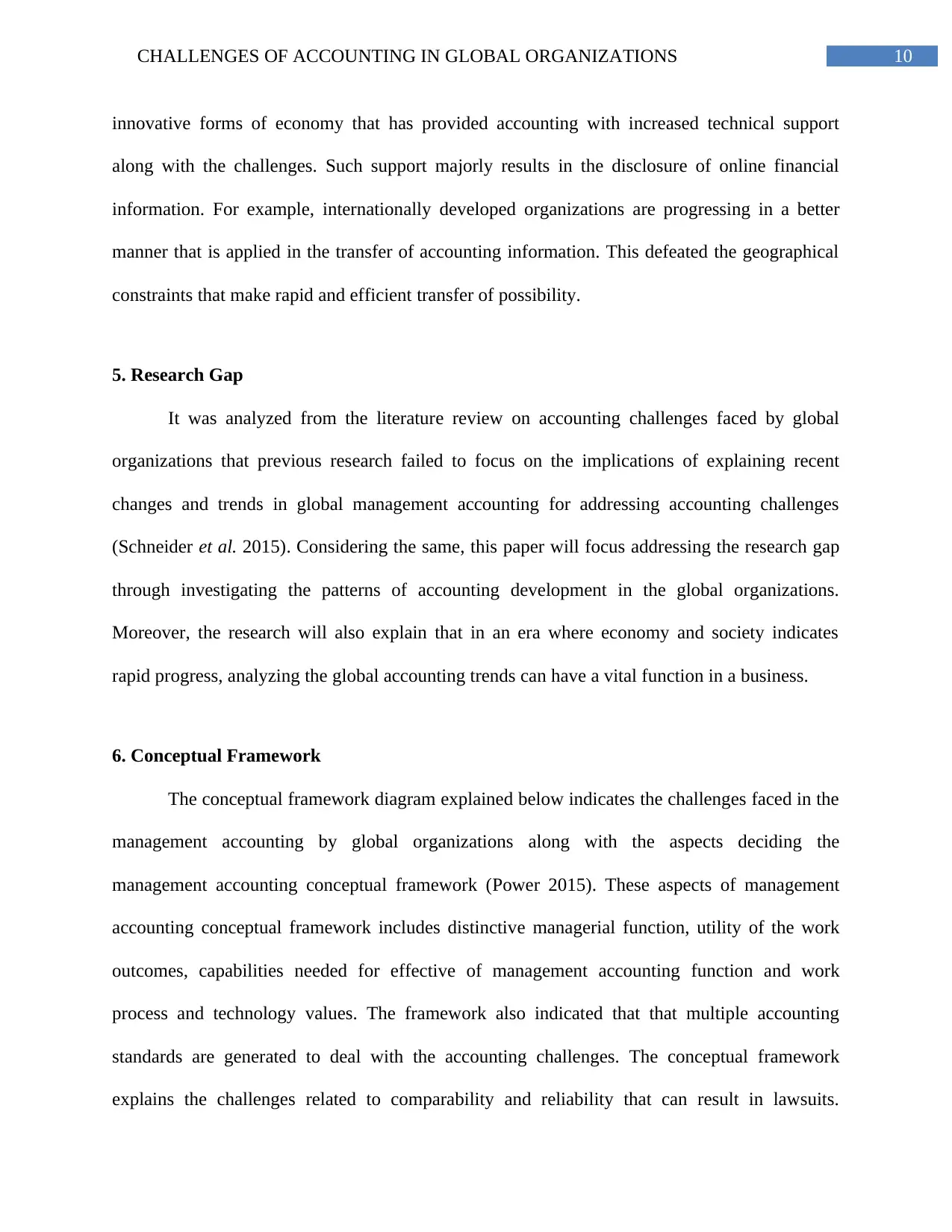
10CHALLENGES OF ACCOUNTING IN GLOBAL ORGANIZATIONS
innovative forms of economy that has provided accounting with increased technical support
along with the challenges. Such support majorly results in the disclosure of online financial
information. For example, internationally developed organizations are progressing in a better
manner that is applied in the transfer of accounting information. This defeated the geographical
constraints that make rapid and efficient transfer of possibility.
5. Research Gap
It was analyzed from the literature review on accounting challenges faced by global
organizations that previous research failed to focus on the implications of explaining recent
changes and trends in global management accounting for addressing accounting challenges
(Schneider et al. 2015). Considering the same, this paper will focus addressing the research gap
through investigating the patterns of accounting development in the global organizations.
Moreover, the research will also explain that in an era where economy and society indicates
rapid progress, analyzing the global accounting trends can have a vital function in a business.
6. Conceptual Framework
The conceptual framework diagram explained below indicates the challenges faced in the
management accounting by global organizations along with the aspects deciding the
management accounting conceptual framework (Power 2015). These aspects of management
accounting conceptual framework includes distinctive managerial function, utility of the work
outcomes, capabilities needed for effective of management accounting function and work
process and technology values. The framework also indicated that that multiple accounting
standards are generated to deal with the accounting challenges. The conceptual framework
explains the challenges related to comparability and reliability that can result in lawsuits.
innovative forms of economy that has provided accounting with increased technical support
along with the challenges. Such support majorly results in the disclosure of online financial
information. For example, internationally developed organizations are progressing in a better
manner that is applied in the transfer of accounting information. This defeated the geographical
constraints that make rapid and efficient transfer of possibility.
5. Research Gap
It was analyzed from the literature review on accounting challenges faced by global
organizations that previous research failed to focus on the implications of explaining recent
changes and trends in global management accounting for addressing accounting challenges
(Schneider et al. 2015). Considering the same, this paper will focus addressing the research gap
through investigating the patterns of accounting development in the global organizations.
Moreover, the research will also explain that in an era where economy and society indicates
rapid progress, analyzing the global accounting trends can have a vital function in a business.
6. Conceptual Framework
The conceptual framework diagram explained below indicates the challenges faced in the
management accounting by global organizations along with the aspects deciding the
management accounting conceptual framework (Power 2015). These aspects of management
accounting conceptual framework includes distinctive managerial function, utility of the work
outcomes, capabilities needed for effective of management accounting function and work
process and technology values. The framework also indicated that that multiple accounting
standards are generated to deal with the accounting challenges. The conceptual framework
explains the challenges related to comparability and reliability that can result in lawsuits.
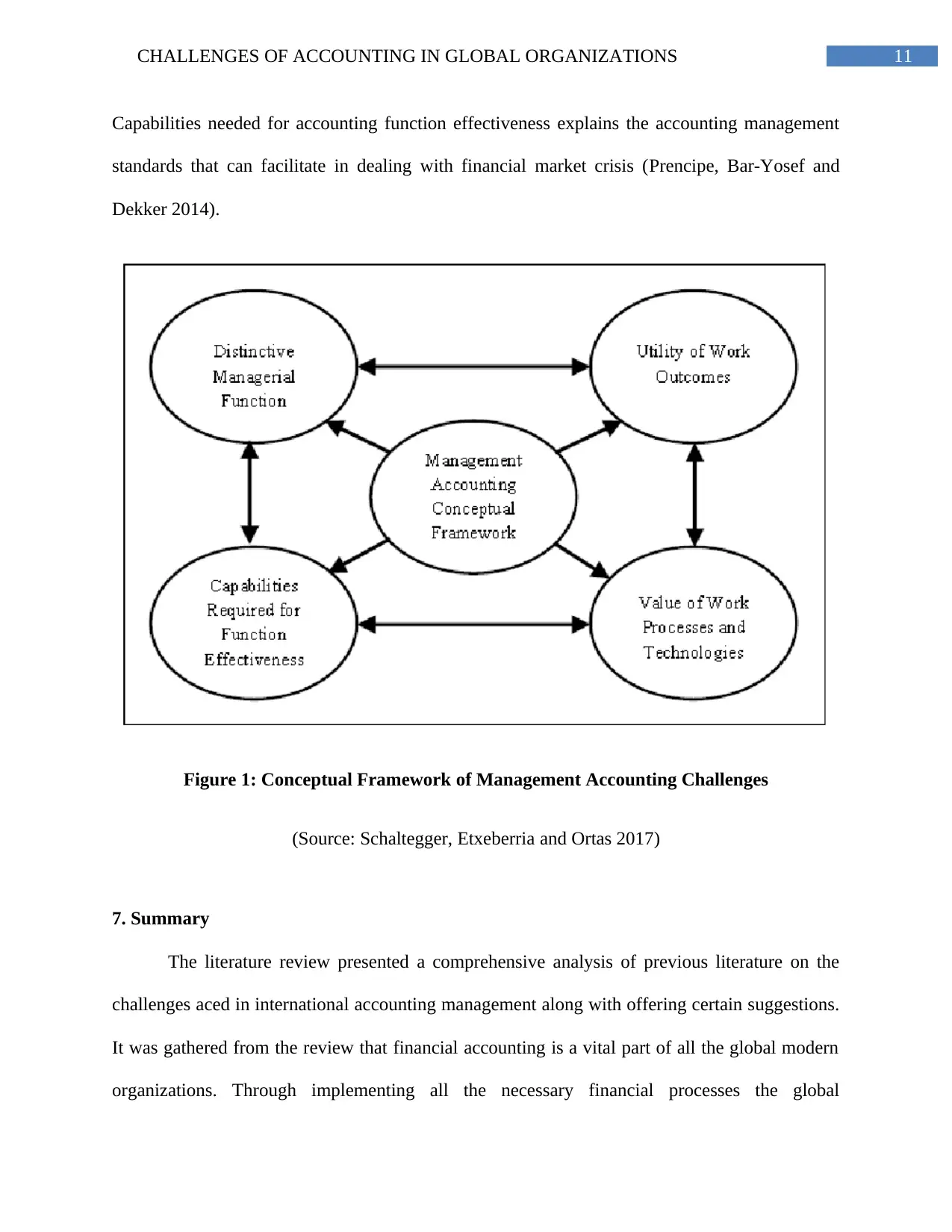
11CHALLENGES OF ACCOUNTING IN GLOBAL ORGANIZATIONS
Capabilities needed for accounting function effectiveness explains the accounting management
standards that can facilitate in dealing with financial market crisis (Prencipe, Bar-Yosef and
Dekker 2014).
Figure 1: Conceptual Framework of Management Accounting Challenges
(Source: Schaltegger, Etxeberria and Ortas 2017)
7. Summary
The literature review presented a comprehensive analysis of previous literature on the
challenges aced in international accounting management along with offering certain suggestions.
It was gathered from the review that financial accounting is a vital part of all the global modern
organizations. Through implementing all the necessary financial processes the global
Capabilities needed for accounting function effectiveness explains the accounting management
standards that can facilitate in dealing with financial market crisis (Prencipe, Bar-Yosef and
Dekker 2014).
Figure 1: Conceptual Framework of Management Accounting Challenges
(Source: Schaltegger, Etxeberria and Ortas 2017)
7. Summary
The literature review presented a comprehensive analysis of previous literature on the
challenges aced in international accounting management along with offering certain suggestions.
It was gathered from the review that financial accounting is a vital part of all the global modern
organizations. Through implementing all the necessary financial processes the global
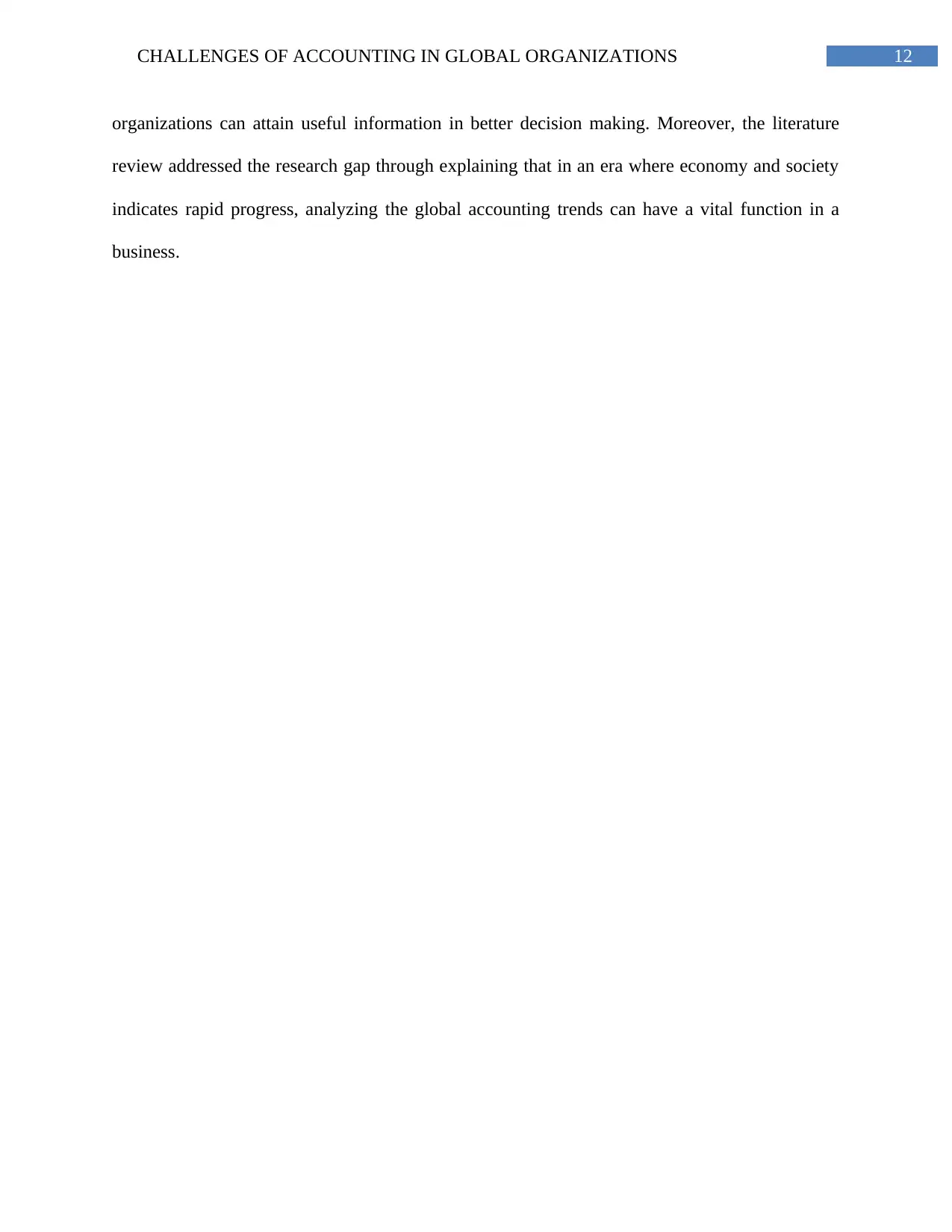
12CHALLENGES OF ACCOUNTING IN GLOBAL ORGANIZATIONS
organizations can attain useful information in better decision making. Moreover, the literature
review addressed the research gap through explaining that in an era where economy and society
indicates rapid progress, analyzing the global accounting trends can have a vital function in a
business.
organizations can attain useful information in better decision making. Moreover, the literature
review addressed the research gap through explaining that in an era where economy and society
indicates rapid progress, analyzing the global accounting trends can have a vital function in a
business.
Paraphrase This Document
Need a fresh take? Get an instant paraphrase of this document with our AI Paraphraser
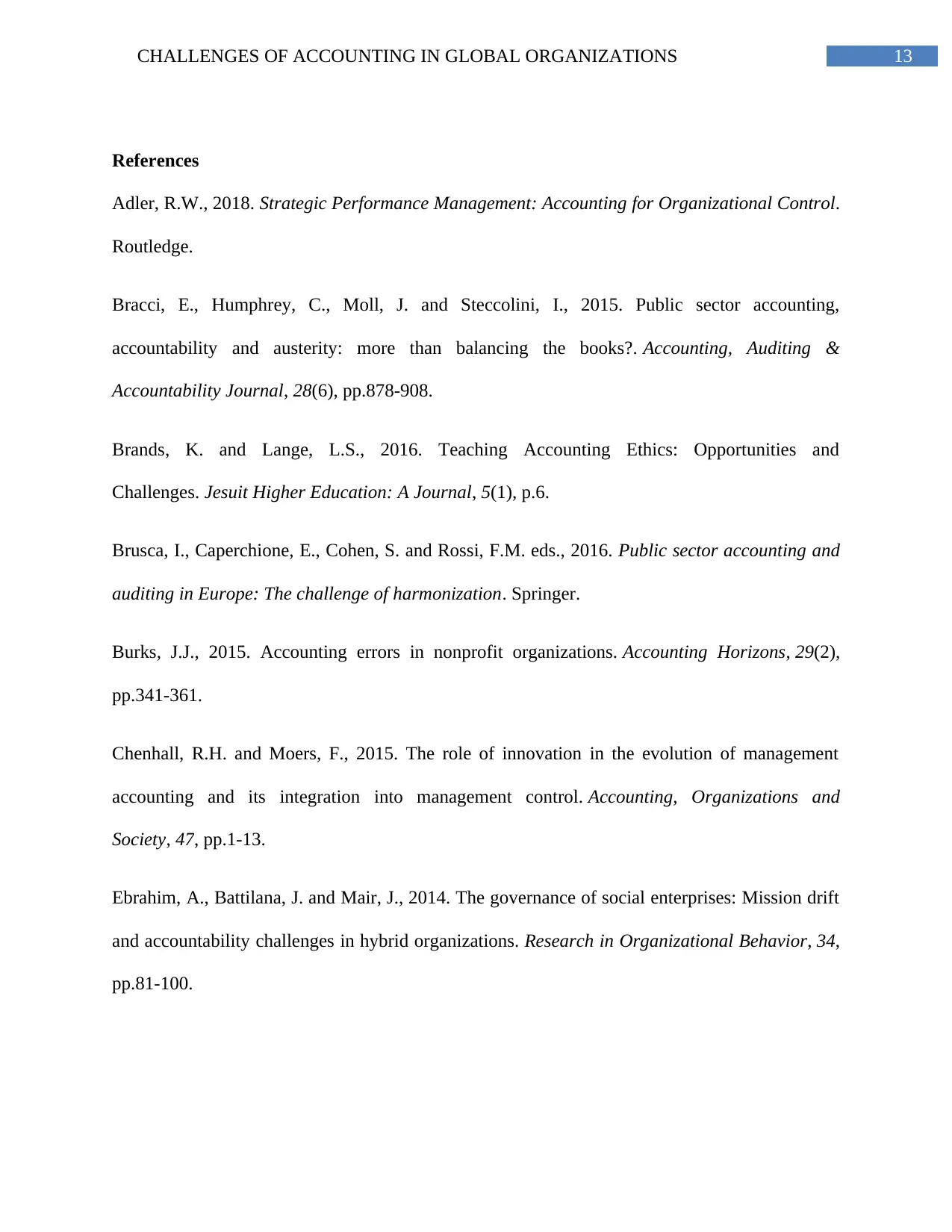
13CHALLENGES OF ACCOUNTING IN GLOBAL ORGANIZATIONS
References
Adler, R.W., 2018. Strategic Performance Management: Accounting for Organizational Control.
Routledge.
Bracci, E., Humphrey, C., Moll, J. and Steccolini, I., 2015. Public sector accounting,
accountability and austerity: more than balancing the books?. Accounting, Auditing &
Accountability Journal, 28(6), pp.878-908.
Brands, K. and Lange, L.S., 2016. Teaching Accounting Ethics: Opportunities and
Challenges. Jesuit Higher Education: A Journal, 5(1), p.6.
Brusca, I., Caperchione, E., Cohen, S. and Rossi, F.M. eds., 2016. Public sector accounting and
auditing in Europe: The challenge of harmonization. Springer.
Burks, J.J., 2015. Accounting errors in nonprofit organizations. Accounting Horizons, 29(2),
pp.341-361.
Chenhall, R.H. and Moers, F., 2015. The role of innovation in the evolution of management
accounting and its integration into management control. Accounting, Organizations and
Society, 47, pp.1-13.
Ebrahim, A., Battilana, J. and Mair, J., 2014. The governance of social enterprises: Mission drift
and accountability challenges in hybrid organizations. Research in Organizational Behavior, 34,
pp.81-100.
References
Adler, R.W., 2018. Strategic Performance Management: Accounting for Organizational Control.
Routledge.
Bracci, E., Humphrey, C., Moll, J. and Steccolini, I., 2015. Public sector accounting,
accountability and austerity: more than balancing the books?. Accounting, Auditing &
Accountability Journal, 28(6), pp.878-908.
Brands, K. and Lange, L.S., 2016. Teaching Accounting Ethics: Opportunities and
Challenges. Jesuit Higher Education: A Journal, 5(1), p.6.
Brusca, I., Caperchione, E., Cohen, S. and Rossi, F.M. eds., 2016. Public sector accounting and
auditing in Europe: The challenge of harmonization. Springer.
Burks, J.J., 2015. Accounting errors in nonprofit organizations. Accounting Horizons, 29(2),
pp.341-361.
Chenhall, R.H. and Moers, F., 2015. The role of innovation in the evolution of management
accounting and its integration into management control. Accounting, Organizations and
Society, 47, pp.1-13.
Ebrahim, A., Battilana, J. and Mair, J., 2014. The governance of social enterprises: Mission drift
and accountability challenges in hybrid organizations. Research in Organizational Behavior, 34,
pp.81-100.
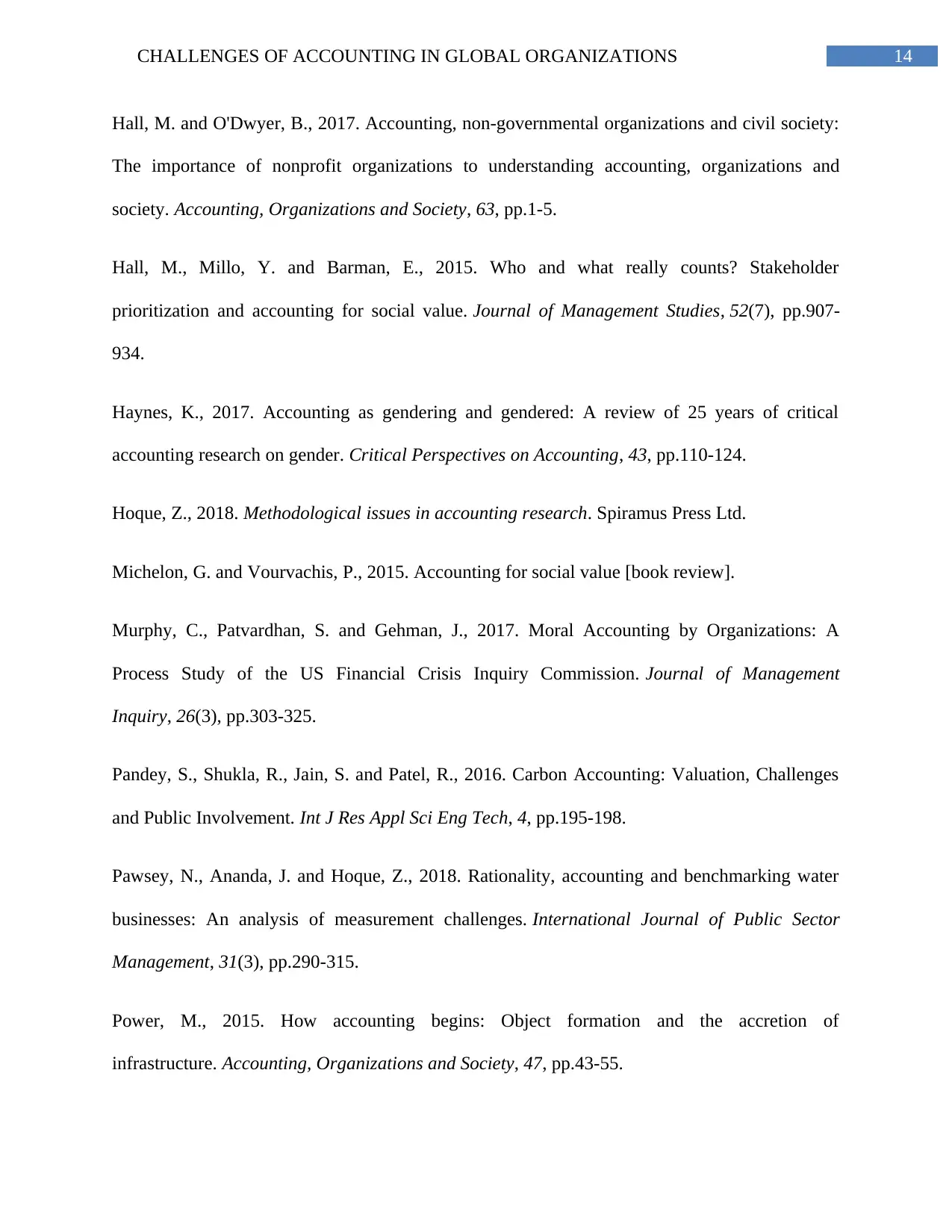
14CHALLENGES OF ACCOUNTING IN GLOBAL ORGANIZATIONS
Hall, M. and O'Dwyer, B., 2017. Accounting, non-governmental organizations and civil society:
The importance of nonprofit organizations to understanding accounting, organizations and
society. Accounting, Organizations and Society, 63, pp.1-5.
Hall, M., Millo, Y. and Barman, E., 2015. Who and what really counts? Stakeholder
prioritization and accounting for social value. Journal of Management Studies, 52(7), pp.907-
934.
Haynes, K., 2017. Accounting as gendering and gendered: A review of 25 years of critical
accounting research on gender. Critical Perspectives on Accounting, 43, pp.110-124.
Hoque, Z., 2018. Methodological issues in accounting research. Spiramus Press Ltd.
Michelon, G. and Vourvachis, P., 2015. Accounting for social value [book review].
Murphy, C., Patvardhan, S. and Gehman, J., 2017. Moral Accounting by Organizations: A
Process Study of the US Financial Crisis Inquiry Commission. Journal of Management
Inquiry, 26(3), pp.303-325.
Pandey, S., Shukla, R., Jain, S. and Patel, R., 2016. Carbon Accounting: Valuation, Challenges
and Public Involvement. Int J Res Appl Sci Eng Tech, 4, pp.195-198.
Pawsey, N., Ananda, J. and Hoque, Z., 2018. Rationality, accounting and benchmarking water
businesses: An analysis of measurement challenges. International Journal of Public Sector
Management, 31(3), pp.290-315.
Power, M., 2015. How accounting begins: Object formation and the accretion of
infrastructure. Accounting, Organizations and Society, 47, pp.43-55.
Hall, M. and O'Dwyer, B., 2017. Accounting, non-governmental organizations and civil society:
The importance of nonprofit organizations to understanding accounting, organizations and
society. Accounting, Organizations and Society, 63, pp.1-5.
Hall, M., Millo, Y. and Barman, E., 2015. Who and what really counts? Stakeholder
prioritization and accounting for social value. Journal of Management Studies, 52(7), pp.907-
934.
Haynes, K., 2017. Accounting as gendering and gendered: A review of 25 years of critical
accounting research on gender. Critical Perspectives on Accounting, 43, pp.110-124.
Hoque, Z., 2018. Methodological issues in accounting research. Spiramus Press Ltd.
Michelon, G. and Vourvachis, P., 2015. Accounting for social value [book review].
Murphy, C., Patvardhan, S. and Gehman, J., 2017. Moral Accounting by Organizations: A
Process Study of the US Financial Crisis Inquiry Commission. Journal of Management
Inquiry, 26(3), pp.303-325.
Pandey, S., Shukla, R., Jain, S. and Patel, R., 2016. Carbon Accounting: Valuation, Challenges
and Public Involvement. Int J Res Appl Sci Eng Tech, 4, pp.195-198.
Pawsey, N., Ananda, J. and Hoque, Z., 2018. Rationality, accounting and benchmarking water
businesses: An analysis of measurement challenges. International Journal of Public Sector
Management, 31(3), pp.290-315.
Power, M., 2015. How accounting begins: Object formation and the accretion of
infrastructure. Accounting, Organizations and Society, 47, pp.43-55.
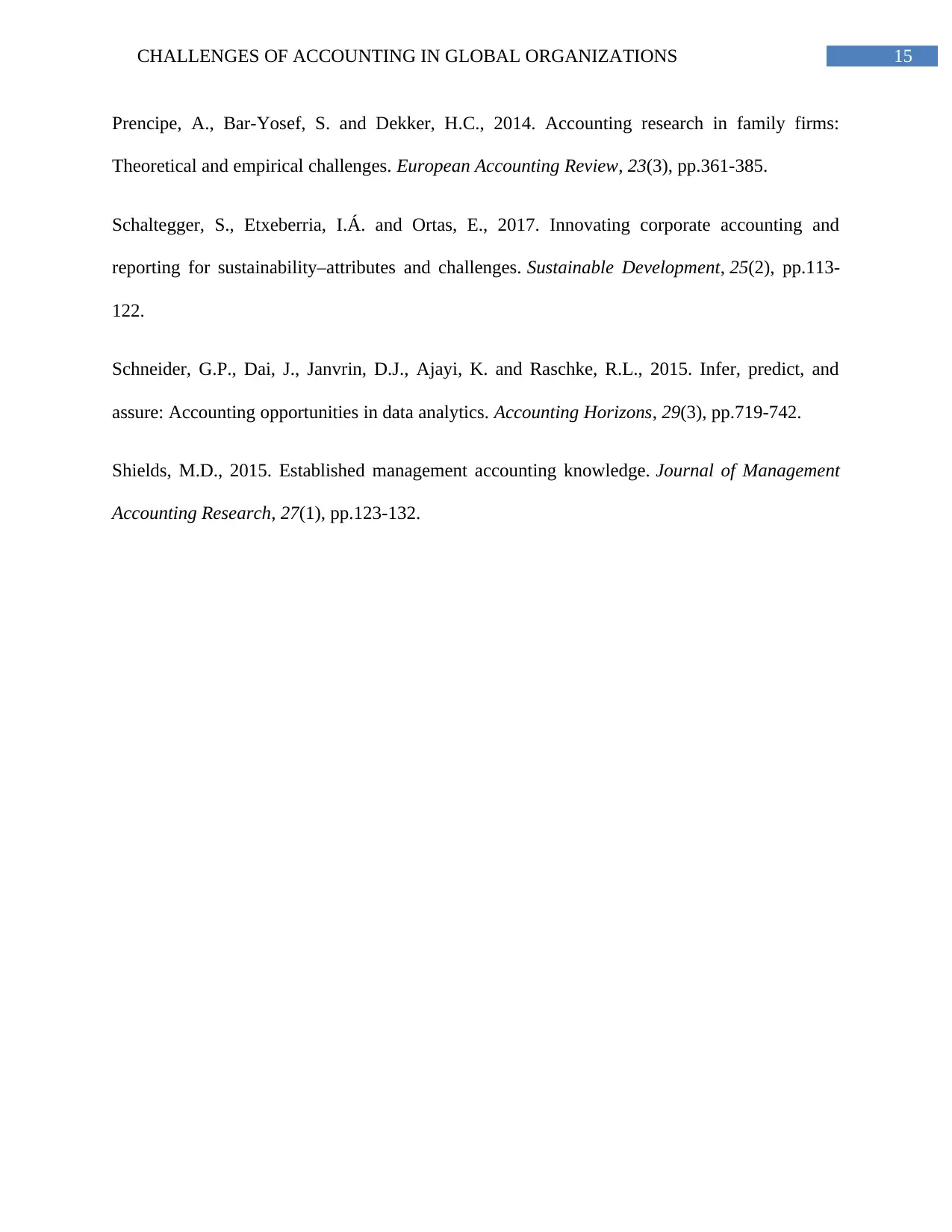
15CHALLENGES OF ACCOUNTING IN GLOBAL ORGANIZATIONS
Prencipe, A., Bar-Yosef, S. and Dekker, H.C., 2014. Accounting research in family firms:
Theoretical and empirical challenges. European Accounting Review, 23(3), pp.361-385.
Schaltegger, S., Etxeberria, I.Á. and Ortas, E., 2017. Innovating corporate accounting and
reporting for sustainability–attributes and challenges. Sustainable Development, 25(2), pp.113-
122.
Schneider, G.P., Dai, J., Janvrin, D.J., Ajayi, K. and Raschke, R.L., 2015. Infer, predict, and
assure: Accounting opportunities in data analytics. Accounting Horizons, 29(3), pp.719-742.
Shields, M.D., 2015. Established management accounting knowledge. Journal of Management
Accounting Research, 27(1), pp.123-132.
Prencipe, A., Bar-Yosef, S. and Dekker, H.C., 2014. Accounting research in family firms:
Theoretical and empirical challenges. European Accounting Review, 23(3), pp.361-385.
Schaltegger, S., Etxeberria, I.Á. and Ortas, E., 2017. Innovating corporate accounting and
reporting for sustainability–attributes and challenges. Sustainable Development, 25(2), pp.113-
122.
Schneider, G.P., Dai, J., Janvrin, D.J., Ajayi, K. and Raschke, R.L., 2015. Infer, predict, and
assure: Accounting opportunities in data analytics. Accounting Horizons, 29(3), pp.719-742.
Shields, M.D., 2015. Established management accounting knowledge. Journal of Management
Accounting Research, 27(1), pp.123-132.
1 out of 16
Related Documents
Your All-in-One AI-Powered Toolkit for Academic Success.
+13062052269
info@desklib.com
Available 24*7 on WhatsApp / Email
![[object Object]](/_next/static/media/star-bottom.7253800d.svg)
Unlock your academic potential
© 2024 | Zucol Services PVT LTD | All rights reserved.





